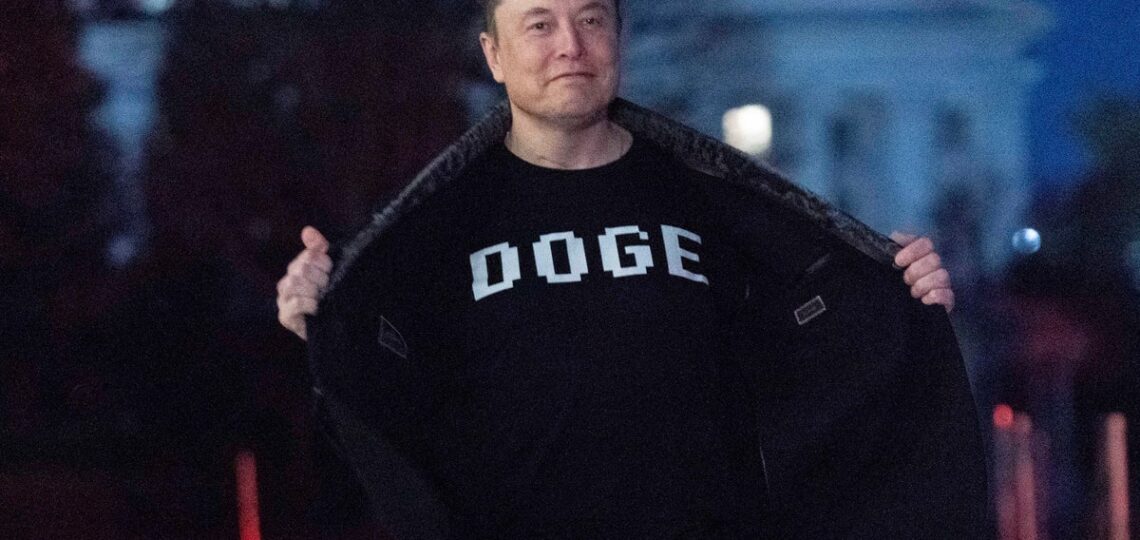
DOGE continues to publish misleading or inaccurate claims on its “Wall of Receipts”
The Department of Government Efficiency, or DOGE, has added a new batch of entries to what it calls its “Wall of Receipts,” touting purported savings in the hundreds of millions of dollars. Yet many of these claimed cuts appear to be misleading, and the potential for actual savings continues to be uncertain.
According to the running tally on its website, DOGE claims it has saved American taxpayers a total of $170 billion. However, only $70.9 billion is itemized, and many of those entries continue to raise serious doubts about their accuracy.
Some have expressed skepticism, including Nat Malkus, a senior fellow at the conservative-leaning American Enterprise Institute. Malkus, who has been tracking DOGE’s work, said his review indicates the savings is more likely to be around $80 billion.
“[They are] over estimating contracts by a factor of two,” Malkus said.
Other costs and expenses associated with staffing reductions could end up costing the government even more than those purported savings.
Since it was created by President Trump via an executive order on his first day in office, the Elon Musk-helmed DOGE started posting purported savings for cancellations to contracts, grants and leases. News organizations including CBS News have identified a multitude of mistakes including triple and even quadruple counting of contracts. Many of those have been corrected after being highlighted but DOGE’s figure for total savings has not.
On Monday, DOGE updated its “Wall of Receipts” to include at least 848 additional contracts. Those totaled $639 million, with claimed savings of $278.5 million. But 553 were noted as $0 savings.
In this new release, CBS News has identified one major error involving a $38.7 million contract for wastewater monitoring for COVID. DOGE claimed $38 million in savings from canceling it. This is the second largest saving itemized in the most recent release. CBS News contacted the company, Verily Life Sciences, who disputed its cancellation and said that the contract was still active.
A CDC spokesperson confirmed this and clarified that the contract was merely modified, not canceled. “This was an expired scope of work that has been superseded by a new working contract,” the spokesperson explained. The new contract, listed in government databases, is valued at $41 million and extends through August 6, 2026.
“It’s very odd. It’s disingenuous to say they saved all this money,” Malkus told CBS News.
A spokesperson for the White House and DOGE has not responded to questions from CBS News.
DOGE is also now claiming savings in the tens of millions for canceling at least one federal contract—just signed by the Trump administration.
The largest new contract cancellation posted to the Wall of Receipts is for a $72 million administrative support contract recently awarded to Universal Strategic Advisors LLC to assist ICE with expanded immigration enforcement, part of the Trump administration’s move to begin mass deportations. DOGE claimed $66 million in savings, yet the contract had only been awarded a few weeks earlier. A company representative confirmed it was “terminated for convenience,” with no explanation provided by the government. The representative also noted that ICE’s operational needs for such services likely still exist, as the agency continues to expand. The Department of Homeland Security has not yet responded to a CBS News query.
Claimed savings also include $5.6 million from cuts to a program monitoring youth tobacco use, $3.9 million from the cancellation of a national concussion surveillance system, and $1.9 million from terminating a National Firefighter Registry.
According to Malkus “They have this funny math definition of savings that doesn’t accurately capture what the typical person would ever view as a savings amount.”
DOGE also appears to have deleted 96 contracts posted before May 4 totaling $124.7 million in purported savings.
Despite these inconsistencies, DOGE maintains that the “Wall of Receipts” is a model of transparency.
Elon Musk has repeatedly defended the platform — and DOGE’s cost cutting regime — including citing a nearly $1 billion government survey that, he claimed, should have cost just $10,000. Requests to the White House for details on that claim have gone unanswered.
Although the Trump administration insisted Musk was never formally the DOGE administrator, he was DOGE’s public face. Musk recently announced that he’d be stepping back from DOGE to focus on Tesla and his other companies.
Many of these contracts also fall under the “termination for convenience” rule that allows contractors to make claims to the federal government for expenses they’ve incurred like staffing expenses, office space and lost profits. Denials can be appealed to federal courts and may take years to be resolved.
“We know these termination settlements are going in, but is anyone paying attention? I just wonder who is keeping their eyes on that spending,” Malkus says.
Ultimately whether or any of these cuts add up to savings for taxpayers will be determined by Congress, when and if the Trump administration submits a rescission request, a process in which the President formally requests Congress take back funds allocated to specific programs.
A CBS News analysis of government spending revealed that the federal government has spent $200 billion more in its first 100 days than last year— a trend that is projected to continue.